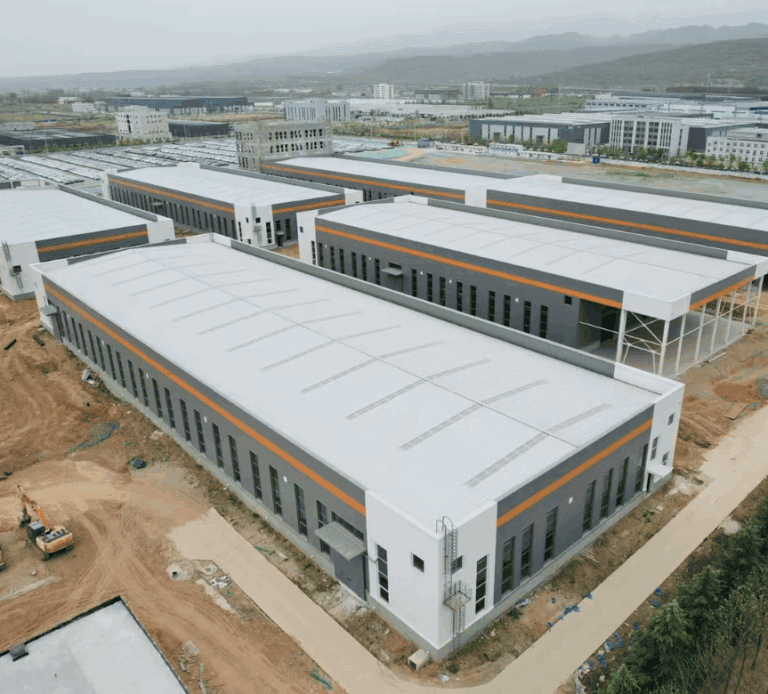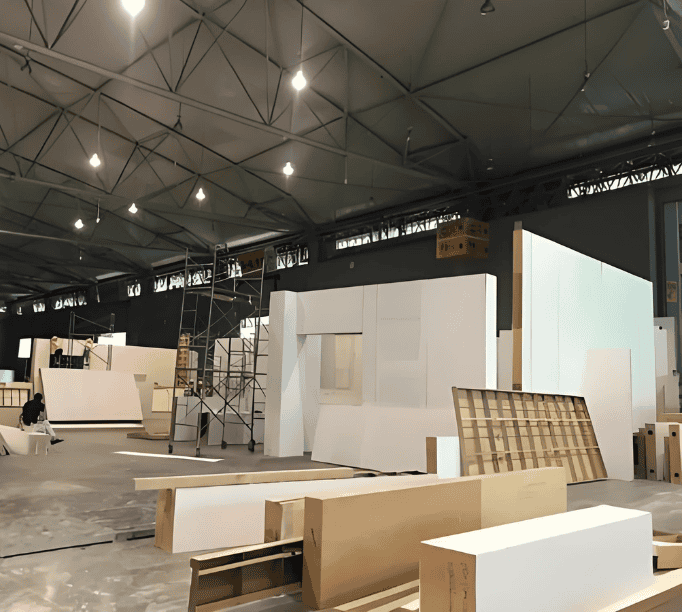Colleges and universities are always evolving to keep up with growing student numbers, new programs, and changing needs. But traditional construction methods, with their long timelines and rigid plans, often can’t keep pace. That’s where modular buildings come in—a smart and flexible solution. Built in factories and quickly assembled on-site, these structures offer great benefits for schools. As campuses grow and modernize without breaking the bank, modular buildings are making it all happen in a cost-effective, practical way.
What Is a Modular Building?
A modular building is a modern way to build using pre-fabricated “modules.” These modules, made in a factory with walls, floors, and finishes, are quickly assembled on-site, making construction faster. Many industries, including tech, have been using modular buildings for years—whether for expanding offices or quick solutions. Continue reading to find out why modular buildings are becoming the top choice for campuses, offering budget-friendly and quick solutions for classrooms, dorms, and libraries.
Why Modular Buildings Are the Solution for Universities
Modular metal buildings are becoming the go-to solution for universities for several key reasons:
Fast Construction
- Perfect for Tight Schedules: Universities often have tight timelines, with winter and summer breaks being the best times for construction. Modular buildings are pre-made in factories and just need to be quickly assembled on-site—kind of like putting together a giant puzzle. This makes construction much faster than traditional methods, ensuring classrooms and dorms are ready before the next semester starts.
- Quick Response to Urgent Needs: Sometimes, universities need to expand quickly for events or academic conferences. Modular buildings can be set up in no time, creating temporary spaces like meeting halls or sports venues, and all with minimal disruption.
Cost-Effective
- Affordable Start-Up Costs: Even though universities usually have good budgets, they’re still careful with spending. Modular buildings are cheaper to build from the start thanks to simplified designs and factory-made components. This saves money on materials and labor, meaning universities can use those savings for things like new equipment or research projects.
- Low Maintenance Over Time: Metal is tough and resistant to corrosion, so modular buildings don’t need a lot of upkeep. Plus, if something does need fixing, it’s easy to swap out a part without huge renovations, cutting down on long-term maintenance costs.
For modular buildings, we offer parts warranties that last for decades, so you can rest easy knowing your investment is covered for the long haul.
Flexible Space
- Adapts to All Kinds of Needs: With so many different programs, universities need flexible spaces. Modular buildings can be rearranged to create larger labs or transformed into art studios or exhibition halls—whatever the school needs at the time.
- Handles Changing Enrollment: Universities often see fluctuations in student numbers. Modular buildings are perfect for this—they can quickly add more rooms or remove extra ones as needed, making sure there’s no wasted space.
Here’s a detailed breakdown of the process for adding and removing modular units, described in a step-by-step manner, which can be easily illustrated in a diagram:
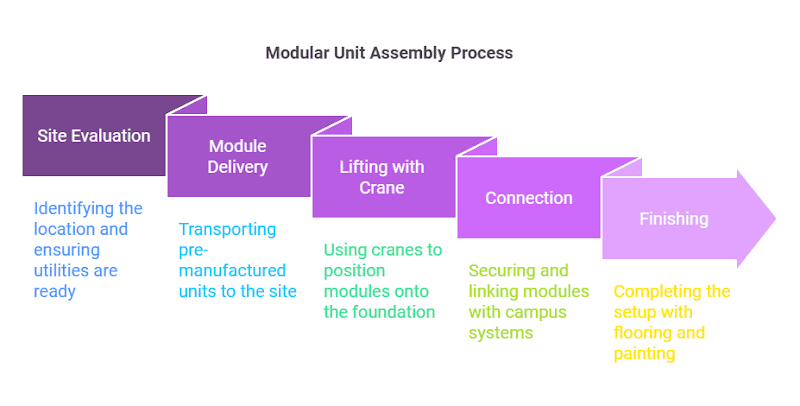
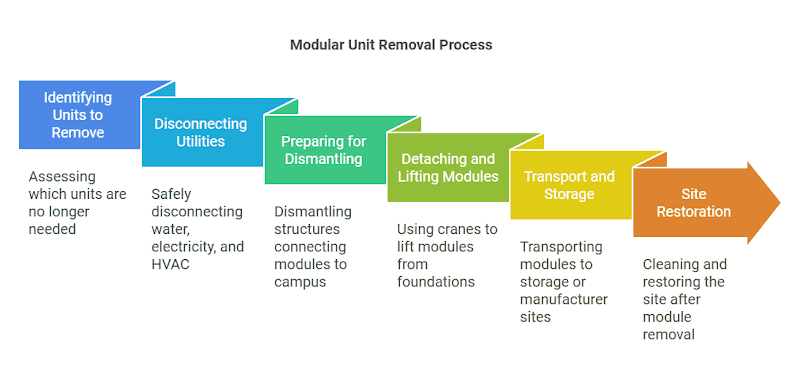
Modern and Attractive Design
- Fits the Campus Vibe: Campuses today want modern, open designs. Modular buildings with metal materials and big glass walls have sleek, simple lines that fit right in with older buildings while bringing a fresh, exciting look to the campus.
- Becomes a Campus Landmark: Modular buildings aren’t just practical—they can be pretty cool looking too! They often become landmarks on campus, boosting school pride and attracting visitors. They’re also great for hosting events and making the school shine in the public eye.
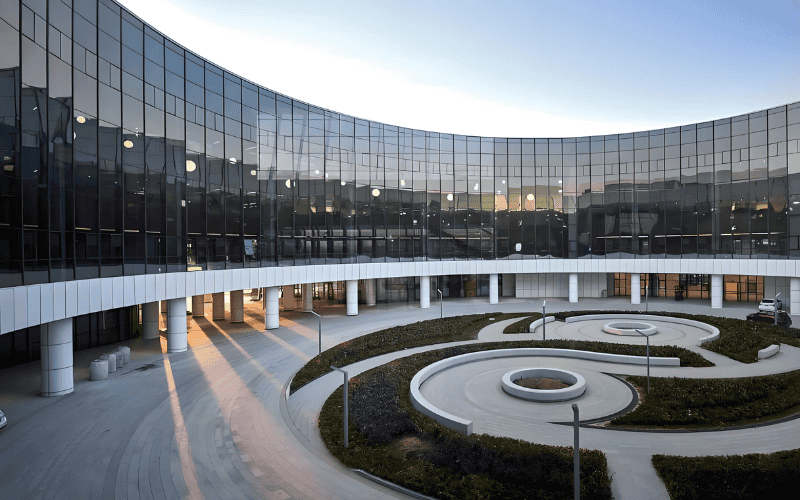
Sustainability
- Eco-Friendly and Energy Efficient: Modular buildings are designed with sustainability in mind—less waste during production and less pollution on-site. Metal walls and roofs help keep buildings well-insulated, and when you add energy-efficient lighting and temperature control, the energy bills go down, which is great for the environment and the school’s budget.
- Recyclable Materials: When a modular building’s life is over, the metal parts are easy to recycle. Unlike traditional buildings that end up in landfills, modular buildings stay sustainable long after they’re built. This aligns perfectly with schools’ commitment to environmental stewardship and sustainability, reinforcing your dedication to a greener future.
Application of Modular School Buildings – Full of Possibilities
When we think of modular campus buildings, we often picture classrooms or dorms. But they can do so much more! Our modular buildings are flexible and cost-effective, easily adapted to meet a variety of campus needs. From temporary teaching spaces to high-tech labs, the possibilities are endless. Here are some exciting ways they can be used:
| Use Case | Description |
| Temporary Teaching Points | Easily set up for overflow or satellite learning locations. |
| Dormitories | Comfortable, cost-effective housing for students. |
| Exam Centers | Spacious, quiet environments for high-stakes tests. |
| Psychological Counseling Rooms | Dedicated, private spaces for student well-being. |
| Student Activity Centers | Hubs for clubs, events, and extracurriculars. |
| Campus Bookstores | Compact, fully stocked shops tailored to campus needs. |
| Historical Exhibits | Showcasing your institution’s history in a flexible, modern space. |
| Outdoor Learning Pavilions | Ideal for hands-on classes or quiet study breaks. |
| Creative Workshops | Spaces for hands-on learning, from art to engineering projects. |
| Smart Greenhouses | For innovative agriculture and sustainability programs. |
| Astronomy Observatories | Modular setups for exploring the stars. |
| Campus Radio Stations | Compact, high-tech studios for student-run broadcasts. |
| Isolation Wards in Campus Clinics | Safe, clean spaces for healthcare during emergencies. |
| Fitness and Training Rooms | Versatile spaces for physical education and student wellness. |
| Virtual Reality Classrooms | Transforming how students interact with digital content. |
| Campus Package Stations | Convenient, secure locations for parcel collection. |
| Uniform Production Workshops | Specialized spaces for student-run projects or academic courses. |
| Pet Care Facilities | Pet boarding for campuses with relevant programs. |
| Recycling Centers | Promoting sustainability with waste management spaces. |
| Fire Safety Education Centers | Teaching safety protocols and emergency response. |
| 3D Printing Labs | Cutting-edge tech labs for student innovation. |
| Ceramics Studios | Hands-on spaces for art students to learn and create. |
| Garden Pavilions | Relaxing spaces to enjoy the beauty of your campus. |
With modular buildings, the sky’s the limit. They’re not just a solution for expanding classrooms—they’re a creative way to reimagine campus spaces for a modern, flexible education experience.
Want to know what possibilities the future of modularity still holds? Read our article: Modular construction: A New Outlet for the Future of the Steel Structure Industry
Myths About Modular School Buildings
Are modular school buildings not durable enough?
This is a misconception. Modular buildings are made with stricter tolerance controls during factory production, and the installation process is carefully designed. Their structural strength can withstand extreme weather, ensuring reliable quality.
Can modular school buildings reflect campus culture?
Absolutely. While modular buildings are factory-made, they can be enhanced with exterior decorations and landscaping to showcase your school’s history and unique identity.
Is the interior layout of modular school buildings rigid and hard to adapt?
Not at all. Modern modular systems allow for flexible partitioning and reconfiguration, easily adapting to changing teaching and research needs, and offering versatile space utilization.
Do modular school buildings have poor sound and thermal insulation?
Not at all! Thanks to advanced sealing materials and insulation technology, modular buildings meet high standards for soundproofing and thermal insulation, providing a comfortable learning environment free from external distractions.
Is it difficult to install modular school buildings?
Not at all! The components are pre-made in factories, and assembly on-site is like building with blocks. Workers follow simple guides and use professional tools. Compared to traditional construction, modular buildings are faster, easier to install, and less affected by weather. Even regular workers can assemble them quickly with a bit of training.
Can modular school buildings support high-tech educational methods?
Absolutely! Modular buildings are flexible and can easily integrate smart teaching devices, networking systems, and custom high-tech spaces, making them perfect for modern, technology-driven education.
The Future of Modular Educational Buildings
The future of modular educational buildings is exciting and full of potential. As educational needs continue to grow, modular designs will become even more adaptable and efficient. With advanced technology and more sustainable materials, these buildings will offer enhanced energy efficiency and smart integrations for modern learning environments. Expect more flexible, eco-friendly, and high-tech solutions, as well as quicker assembly times and cost-effective options.
At SteelPRO PEB, we’re not just about modular buildings. We offer portable classrooms that can be quickly deployed, making them perfect for expanding or temporarily adapting campus spaces. Additionally, for more complex campus designs, we use light steel structures to create sleek, modern buildings that will be the highlight of your campus. Let us help you transform your educational spaces into functional and inspiring environments!
